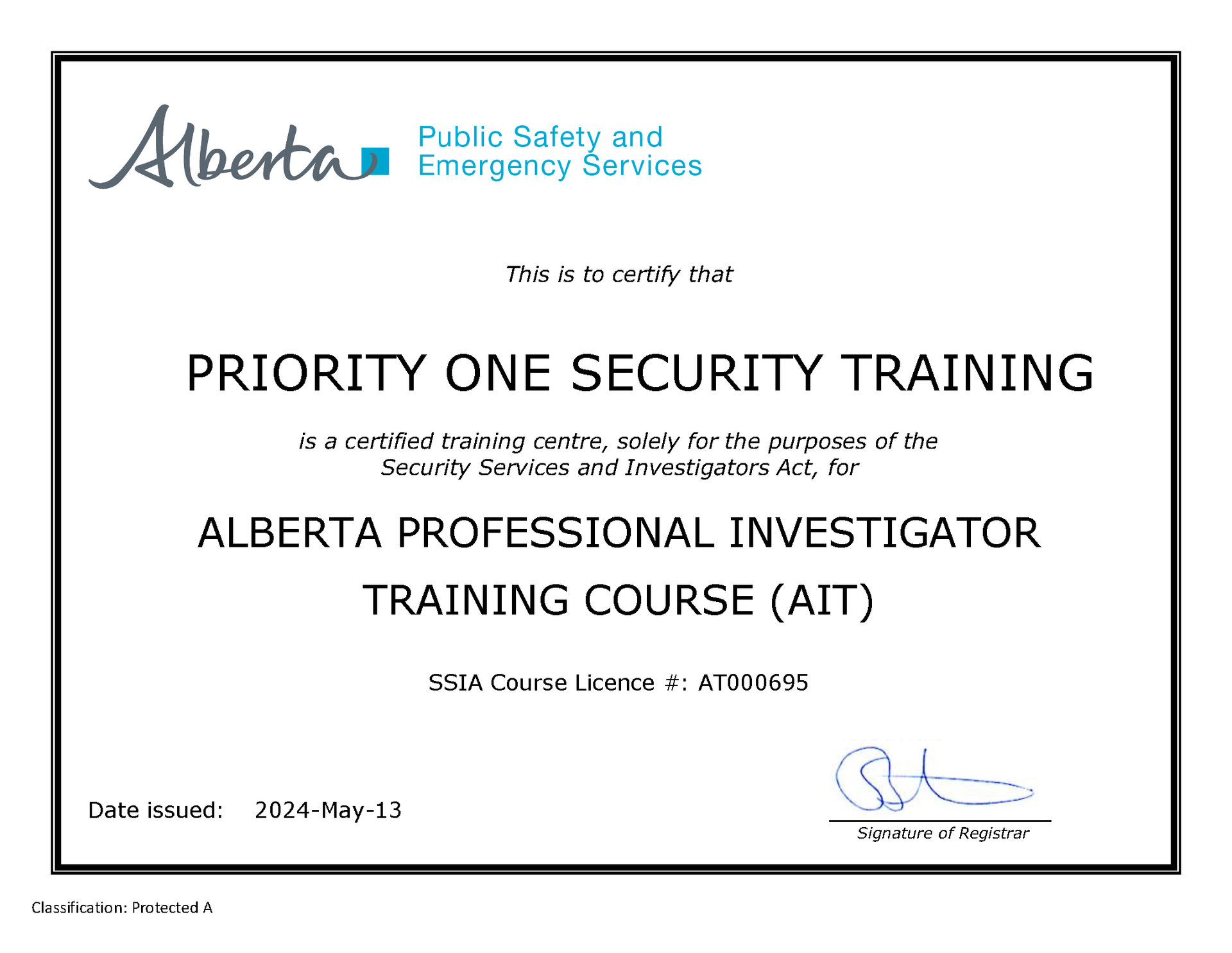Train Online For Your Alberta Private Investigator Course (AIT)
This Alberta Private Investigator Course (AIT) was developed by Security Training Subject Matter Experts in consultation with industry and legal experts to meet or exceed all government standards and is government-approved for persons desiring to work as a private investigator in the Province of Alberta.
Our next Alberta Private Investigator Course (AIT) session is:
AIT July 8, 2024 to July 18, 2024
Terms and Conditions: Full Payment is required to reserve you seat, No Credits or refunds if Cancelation is received after the registration cut off date. Once, paid, we will refund up until the cut off.
Once you have logged your required 60 hrs we will provide you with your Training Certificate and instructions to book your Exam. The exam is paid separately to the provider and costs $60.
At the end of this course, you will be able to
- Describe the roles of professional investigators, the knowledge and skills required, and the types of investigations typically conducted
- Explain the licensing rules, regulations and processes for investigators in Alberta
- Identify the limitations imposed by law on investigative functions, notably the Security Services and Investigators Act, the Criminal Code of Canada, federal and provincial privacy legislation, occupational health and safety legislation and the Canadian Charter of Rights and Freedoms
- Explain basic principles of professionalism and ethical conduct, including client confidentiality and privacy of information within an investigation
- Explain the following concepts: prejudice, discrimination, stereotyping, harassment
- Describe the signs and dynamics of abuse in relationships
- Describe the Ministry’s Code of Conduct and Complaints process
- Identify potential hazards in a workplace and industry-accepted control measures that can mitigate identified hazards
- Describe typical response measures regarding unsafe workplaces/conditions and/or work practices
- Discuss and provide examples of a citizen’s power of arrest under the Criminal Code
- Identify the differences between civil law and criminal law
- Articulate legal , tactical and situational considerations in the decision to use force
- Explain the Use of Force Continuum and how it applies to professional investigators
- Assess client needs, plan an investigation and explain how an investigation is managed, including risk management
- Describe various investigative techniques, including research, surveillance, evidence collection and maintenance, file management and cognitive interviewing
- Identify legal requirements and client/agency rules impacting electronic surveillance of premises and people
- Demonstrate the key components of effective verbal communication, including techniques in challenging, aggressive and/or threatening situations
- Describe the differences between types of reports and demonstrate the ability to write a detailed investigative report and accurate field notes
- Demonstrate appropriate techniques for providing testimony
- Identify basic elements of planning and operating a professional investigation business.
Apply for or renew your licence
If you’re on a work or study permit, contact Security Programs for application and renewal steps.
1
Records check
See your local police service website to find out how to get your documents.
All three searches are mandatory – no exceptions:
- criminal record check
- vulnerable sector search
- local police database search
For all classes of licences:
- your photo does not need to be signed on the back
- these details are important when applying for a police information check:
- security services are designated as essential services
- you must specify the employment type as 'security services' – regardless of licence class
- ask for a print/mail copy of your results to attach to your application – if needed, police services can email results to ssia.registrar@gov.ab.ca
3
Gather your documents
When you apply, you’ll need to provide photocopies of your:
- Canadian photo ID
- approved training course certificate
- 40 hour baton use-of-force training certificate (if applicable)
You’ll also need to provide a current:
- police information and criminal record check, and
- passport-size colour photo
4
Submit and pay for your application
There are 2 ways to submit your application:
In person
Take your application and documents to a registry agent that offers Security Programs licensing services.
Pay the licensing fee and service charge at the registry:
- $160 investigator licensing fee, or
- $160 dual security service and investigator licensing fee, and
- $9 service charge
If your application is approved, you'll get a temporary licence that's valid for 60 days.
By mail
Send us your:
- completed application form
- required documents
- payment or online payment receipt for:
- $160 investigator licensing fee, or
- $160 dual security service and investigator licensing fee
Pay the licensing fee with a (made payable to the Government of Alberta):
- certified business cheque, or
- certified personal cheque, or
- money order, or
- bank draft
or
Pay by credit or debit online:
- print and mail the receipt with your completed application
Course Content
Module 1: Introduction to the Investigation Industry
Introduction to Investigators and Investigations
Roles, Responsibilities and Limitations of an Investigator
Investigator Job Description
Principles and Processes in Investigations
Investigator Licensing in Alberta
Investigator Professional Development and Professional Designations
Module 2: Professionalism and Ethics
Defining Ethics and Professionalism
Core Principles of Professionalism and Ethics
Codes of Conduct
Other Examples of Code of Conduct
Complaints Process
Provincial and Federal Privacy Legislation
Prejudice, Discrimination, Stereotyping, Violence in Relationships and Harassment
Violence in Relationships
Module 3: Health and Safety
Alberta Occupational Health and Safety Act, Regulations and Code
Identifying Potential Hazards
Controlling Hazards
Response Measures
Incident Reporting
Addenda:
Key OHS Act Sections, By Number
Key OHS Regulation Components
Key OHS Code Components
Example Mitigation (Control) Measures
Module 4: Law and the Canadian Legal System
The Canadian Charter of Rights and Freedoms
The Charter and the Investigator
Alberta Human Rights Act
Criminal Code of Canada
Powers of Arrest
Powers of Search
Criminal Code Offences
Surveillance and Audio Recording
Evidence Acts
Addenda:
Further Information on Criminal Code
Guidance on Covert Video Surveillance in the Private Sector
Module 5: Use of Force
Introduction to Use of Force
Sec. 25, Criminal Code of Canada – Use of Force
Sec. 26, Criminal Code of Canada – Excessive Force
Sec. 27, Criminal Code of Canada – Prevention of a Crime
Sec. 34, Criminal Code of Canada – Prevention of an Unprovoked Assault
Overview of the Use of Force Continuum Model
Module 6: Investigations
Purposes of an Investigation
Planning an Investigation and Managing Risk
Cognitive Failures in Investigations
Managing Investigative Risk
Investigative Techniques: An Introduction
Interviewing
Surveillance
Collection of Physical Evidence
Collection of Information from Open and Closed Sources
Undercover Work
Confidential Sources
Investigation File Management and Preservation
Module 7: Communications and Report Writing
Verbal and Non-Verbal Communication
Challenges to Communication
Seven Steps for Effective Communication
Communicating With Uncooperative Persons
Field Notes
Report Writing
Privacy Legislation and Reports
Common Errors in Writing Reports
Structure of Reports
Providing Testimony
Module 8: Specialized Investigations
Introduction to Specialized Investigations
In-House Investigations
Regulatory Investigations
Barrister and Solicitor Investigations
Location of Persons Investigations
Corporate and Due Diligence Investigations
Insurance Investigations
Occupational Health and Safety Investigations
Private Client Investigations
Retail Sector Investigations
The Use of Experts
Specialized Professional Development
Module 9: Business of Investigations
Overview of the Business Side of Investigations
The Investigations Business
Licensing: Individuals
Licensing: Companies
Contracts and Agreements
Personnel and Systems
Equipment and Data
Insurance
Databases and Anonymity
Clients
Compliance and Risk Mitigation Systems
Ongoing Professional Development
Addendum:
Sample Template for Client Service Agreement
SSIA Course License - Alberta Professional Investigator Training




